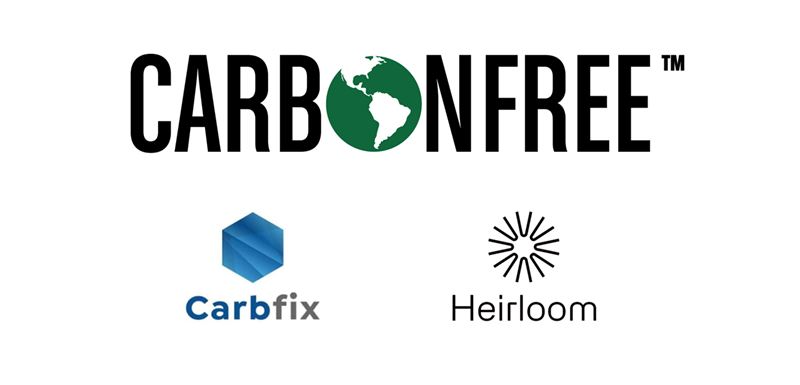Since the advent of the Industrial Revolution, the concentration of carbon has increased by 50 % from the initial years. The primary cause of this increase is human activity. COP28, scheduled to take place in Dubai on November 30 will feature the first Global Stock take, which will assess the member nations’ current progress towards meeting the targets set by the Paris Agreement. Addressing climate change has become increasingly urgent, and in response, various companies have stepped up to confront this challenge with innovative solutions. Here are a few of them:
Carbfix
Carbfix, founded in 2006, specialises in carbon capture and storage (CCS) technology, adopting a unique way of injecting captured CO2 deep down into basaltic rock formations.
Carbfix transforms carbon capture by replicating natural rock-based storage processes. It dissolves CO2 in water and quickly reacts with rocks such as basalts to generate stable minerals, resulting in a long-term CO2 storage solution. The method injects CO2-enriched water underground within two years, stimulating interactions with certain rocks and producing solid carbonates. It captures 1 billion tonnes of CO2 annually (during a lifetime).
Basalts are particularly good options due to their abundance and reactive nature. Carbfix’s effectiveness is determined by rigorous monitoring of tracers and geochemical signals in surrounding wells, confirming its potential as an environmentally benign carbon capture and storage approach. This innovative approach assures efficient CO2 removal and conforms to legal standards, guaranteeing a long-term route forward in the worldwide fight against climate change. The invention of Carbfix is based on nature-inspired solutions, utilising Earth’s natural processes to address one of humanity’s most critical environmental concerns.
CarbonFree
CarbonFree is a pioneering developer of patented technology for capturing CO2 from fixed point source emitters and converting it into carbon-negative compounds. The annual carbon capture (in tons of CO2) of the company is 800 million. Sky Mine, situated in San Antonio, Texas, has been in operation since 2016. It is the world’s first and largest industrial-scale carbon mining facility. Their concept anticipates a future in which industrial manufacturing plants cut CO2 emissions while providing environmentally sustainable products.
CarbonFree generates sodium bicarbonate (baking soda), precipitated calcium carbonate (PCC), and hydrochloric acid via SkyCycle™ and SkyMine®. These ground-breaking techniques use CO2 capture to make useful, durable products.
By providing on-site solutions, the company’s modular and scalable technology revolutionises established procedures. This eliminates the need for expensive infrastructure to transport and store CO2, making sustainable carbon transformation a viable option for industrial sites.
CarbonFree’s transformative strategy not only reduces carbon footprints but also reshapes industrial processes to be more environmentally conscientious. They demonstrate a sustainable paradigm change in production by converting pollutants into valuable resources, paving the door for a greener industrial landscape.
These companies are at the forefront of addressing one of the world’s most critical issues. Their inventive efforts demonstrate the variety of tactics being used to address climate change, each contributing to a more sustainable future.
Heirloom
Heirloom Carbon Technologies is leading an important effort to address the serious challenge of extracting billions of tons of CO2 from the air annually. This endeavour is critical for limiting global temperature rise and ensuring a sustainable future. Even if all emissions were immediately stopped, the residual CO2 in our atmosphere would pose a huge concern, continuing for thousands of years and accelerating planetary warming. Direct Air Capture (DAC) emerges as the most practical technique for permanently removing CO2, while Heirloom’s approach pioneers a game-changing strategy that uses naturally available minerals.
Current CO2 concentrations in the atmosphere reach 410 parts per million, with annual emissions exceeding 35 billion metric tons. To counteract climate change, urgent, effective CO2 removal technologies are required.
Heirloom redefines DAC (by utilising nature’s energy-efficient carbon mineralisation reactions. Instead of synthetic sorbents, naturally occurring minerals, particularly calcium carbonate (CaCO3), are used in this revolutionary technique. Their technology improves capture efficiency by increasing the contact area between the air and the sorbent. This innovative process, divided into regeneration and carbonation steps, highlights the quantity of calcium carbonate, which makes up around 4% of the Earth’s crust and offers a viable avenue for efficient CO2 removal.
Heirloom promises a scalable, sustainable, and effective way to drastically reduce CO2 levels in our atmosphere by leveraging nature’s mechanisms and tapping into abundant natural resources. This mitigates the current environmental issues created by high CO2 levels and establishes a transformative precedent for a more sustainable future.



